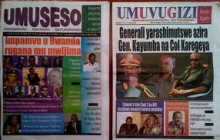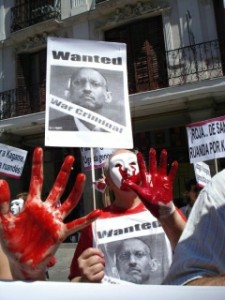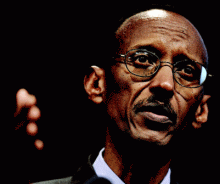Rwanda Media High Council releases list of allowed media organs
Kigali – The Media High Council on Wednesday released a new list of the media which will be accepted to operate in the country � leaving out almost all the controversial tabloids some of which have been suspended.
From a review process which started August last year, with deadlines extended twice up to July 16, the Media Council said 19 radio stations and 22 newspapers are the ones which qualified.
�This list does not include media organs licensed or approved for license after the promulgation of the media law but specifically those that were in existence before the publication of the above law in the official gazette,� said Patrice Mulama, the Council Executive Secretary.
Available statistics suggest there were up to 70 newspapers and about a dozen radios � with just a single local TV station.
All media organisations including the Rwanda News Agency � which also has a newspaper Grands Lacs Hebdo, were required to submit several documents including an operating business licence and CVs of senior staff. The practice was launched with the coming into force of the new media law in August 2009.

The two were suspended in April for six months, and are now not on the list. The Media Council has a case in the courts seeking to have them banned completelyThe last covers of Umuseso and Umuvugizi, for a while
Looking at the list which was made public Wednesday, the notable absentees include controversial tabloids UMUSESO and UMUVUGIZI which were suspended in April.
UMURABYO, whose editors Agnes Uwimana and Saidath Mukakibibi are facing prosecution over several charges, is also not on the list. Others missing are small publications that have largely been irregular on the market such as UMUSEKE.
�The Media High Council (MHC) congratulates all the law abiding media organs and their managers and requests them to keep up the effort of transforming the Rwandan media into a credible and decent profession that effectively contributes to national development,� said Mulama in a statement.
�All law enforcing organs are also hereby called upon to ensure compliance.�
Only German broadcaster DW � which has an FM frequency, is missing on the list of radios, which includes BBC.
The full list below:
Radios and TV
1. Radio Rwanda
2. Rwanda Television
3. Radio y�abaturage ya Huye
4. Radio y�abaturage ya Rusizi
5. Radio y�abaturage ya Rubavu
6. Radiyo y�abaturage ya Musanze
7. Radiyo y�abaturage ya Nyagatare
8. Radio 10
9. Flash FM
10. Contact FM
11. City Radio
12. Radio Isango Star
13. Radio Maria
14. Radio Izuba
15. Radio Salus
16. Amazing Grace Radio
17. Voice of Hope
18. Umucyo Community Radio
19. BBC
Newspapers
1. The New Times
2. Izuba rirashe
3. Imvaho Nshya
4. La Nouvelle Releve
5. Umwezi
6. Rwanda News Agency/Grand Lac Hebdo
7. Ishema
8. East African Business Week
9. Huguka
10. Oasis Gazette
11. Rugari
12. Kinyamateka
13. Isimbi
14. Umusanzu
15. Le Reveil
16. Amahoro
17. Impamo
18. Amani
19. Umusingi
20. Imanzi
21. Ibiyaga bigali
22. Rwanda Focus
Source: High Media Council
– If you want to receive Rwandinfo articles in English through your RSS Reader, click here.
July 29, 2010 No Comments
‘Average Citizen’ is key to change in Rwanda
An Opposition Focus in Rwanda

Kagame is now seen as hogging power
Rwanda has experienced some turmoil since the beginning of the year when presidential hopeful Victoire Ingabire Umuhoza returned to the country after 16 years in exile. In the wake of her return, events quickly unfolded that, so far at least, seem to have pulled back the curtain to expose the true intent of the regime in Kigali.
Supporters of the regime switched from singing its praises and how it was a “beacon” in the region, to claiming that Rwanda needs action at the moment more than it needs democracy.
As a result, Kagame is now seen as hogging power and more of a dictator than a democratically-elected leader.
Kagame is a man of many admirers and about as many critics. Yet, to all, it is clear that he is not interested in a conventional democracy. The opposition, and many foreign critics, have jumped on this fact and called for him to step down, either voluntarily or through elections, to allow for a more democracy-conducive atmosphere. However, if there is no Kagame, who can take the reins in Rwanda and prevent what could possibly rival the 1994 genocide and its bloodshed?
The key – and what the opposition should be focused on – is targeting the average citizen to change their mindset. Many in the middle and upper social classes have a lot of interest vested in the current regime that they don’t want to, or are afraid to, see things change. The average citizen, poor and largely uneducated beyond a few years of primary school, is the pawn without which the game cannot be won.
In 1994, the majority of the killings were not carried out by the army, but by regular people. The people were conditioned by a system of hate and paranoia that they were able to be exploited to achieve ends beneficial to a few strongmen. This same system that conditions them in this way, also, allows for the creation of strongmen such as Kagame.
The only way to retain power in such a system is to divide the citizens and play them against each other through fear-mongering. As soon as someone rises up to question the role of the RPF, the current ruling party in Kigali, they are accused of “genocide ideology,” a law so vague and convoluted that if it had a genuine purpose, it has since been lost. The Tutsi population, which is still hurting from 1994, is afraid that the numerically-superior Hutu are biding their time to finish what they weren’t able to finish. The Hutu look at the militarily-superior Tutsi and wonder when they will be fell upon in revenge. Both look to Kagame as a savior, and he relishes this role while allowing this climate of fear to fester.
This is why the focus should be on the system that creates such people as Kagame. The only way to change the system is to change the hearts and minds of the average citizens so that these exploitative tactics don’t work with them. Only the people will be able to prevent the rise of divisive strongmen from their midst. They have to be able to speak up for their rights, and be willing to lose their lives in the process, rather than cower in fear.
Yes, to many Kagame is a savior, but even Jesus, after saving the world from sin, did not stick around physically forever. Kagame, too, can step aside assured that, after 16 years, he can still guide the country through his actions while he was at the top…if those actions merit that.
To be a great president, you don’t need to single-handedly bring development to your nation. You don’t need to stay forever, and you definitely don’t need to suppress the free expression of ideas.
What you need is to inspire people to take their future in their hands. George Washington did not stay president forever even though he was offered the option.
Thomas Sankara, in his brief 4 years as president, turned an impoverished country around by empowering the people to control their own fate by building their country.
There are many like them, and they are what we need in Rwanda in order to attain true development.
Kagame might feel that the country is not ready to move on without him, but, like a parent of a teenager off to college for the first time, reality has to be faced. He has to trust that his guidance the past 16 years has settled into the minds of the people and that they will make good decisions based on that. Whether Rwanda succeeds or fails if he steps aside is unpredictable, what is predictable, however, is that Rwanda will suffer if he doesn’t.
Not yet, however, not until the opposition has been able to change the system and the people are ready to be led by someone who doesn’t require to be regarded as an overprotective parent. Then, and only then, will the successive rule of strongmen be over in Rwanda.
[Source: Exile Writer]
– If you want to receive Rwandinfo articles in English through your RSS Reader, click here.
July 29, 2010 No Comments
Should Rwanda rights concerns worry investors?

Paul Kagame: There is no clarity at all on who might follow him if he were to go
Rwandan President Paul Kagame might be able to clamp down on dissent ahead of elections without much immediate donor or economic impact, but it could bring longer term investment risks.
Kagame has been feted and courted by Western and multilateral donors, and credited with rebuilding the country after the 1994 genocide. He has also set out a roadmap to move the country of 10 million beyond its dependence on agriculture – primarily tea and coffee – and transform it into an IT hub.
�
�There is no clarity at all on who might follow him if he were to go�
�
�Still, experts warn that erosion of the rule of law makes life more risky for foreign investors.�
“Investor interest in Rwanda is still rising, particularly in infrastructure and agriculture,” said Thomas Vis, a risk management officer at the World Bank. “Obviously if the political situation will seem to be deteriorating, that could have an impact on investment but there are no signs of it.”
But critics and rights groups say he has become increasingly authoritarian, and they are asking questions about the killing of an opposition politician, the shooting in South Africa of a dissident general, the killing of a journalist and the arrest of opposition figures. The government denies involvement.
Nevertheless, investors who had assumed Kagame would remain comfortably in control are wondering more about the future. Many – along with Western governments – would rather keep him. Most expect foreign observers to ultimately rate the elections fair although they may raise some concerns.
“There is no clarity at all on who might follow him if he were to go,” said Control Risks analyst Laura Morrison. “Kagame has played the public relations game very well – the donors have a lot invested in him. It’s almost impossible to imagine they would switch from him now.”
Rwanda is not the only African country praised by the West that looks to have drifted towards authoritarianism in recent years. Uganda and Ethiopia are often cited as similar examples by some analysts.
Certainly, investors have a tendency to prefer authority to chaos. Many say they prefer Russia as an investment destination under President and then Prime Minister Vladimir Putin than they did under the more anarchic rule of Boris Yeltsin.
Sri Lanka lost out on Western aid and preferential access to European textile markets on concerns over alleged human rights abuses in the closing stages of its civil war but investment flows particularly from Asia remain strong.
The rise of China means that losing Western support is much less damaging, providing a crutch to governments such as Sudan and Zimbabwe. A decline in the perceived moral and financial clout of the West – weakened by the financial crisis and Iraq conflict – is also undermining its influence.
Greater self-confidence
“You can’t lose sight of the fact that there have been remarkable strides forward in governance in Africa in the last 10 years and you have seen greater investor confidence with that,” said Thomas Cargill, head of the Africa programme at think tank Chatham House.
“What is happening is not so much that there is more authoritarianism but that it is less disguised. And there is much greater self-confidence in facing the West and saying ‘we’re doing things our way’.”
Still, experts warn that erosion of the rule of law makes life more risky for foreign investors. It feeds into credit assessments by specialist brokerages and premiums charged by political risk insurers to protect against expropriation.
“Authoritarian regimes may provide some comfort in the short term, but most long-term investors will be concerned about falling out of favour with a regime and suffering catastrophic losses as a result,” said Dan Riordan, president for specialty products for insurer Zurich. “Authoritarian regimes also suffer from high levels of corruption, also a significant negative for long-term investors.”
Rwanda itself has been praised for making strides against corruption and improving the investment environment. It was voted the most improved business performance globally by the World Bank.
“In Rwanda, there’s not a lot of democracy as we know it but there is a lot of accountability,” said one Western diplomat.
Foreign firms were generally untroubled unless they went head-to-head with investment and construction firms controlled by the military or ruling party, he said.
But some analysts and investors looking at Africa are no longer willing to talk on the record about Rwanda for fear of antagonising the government and jeopardising business there – usually a sign of a deteriorating environment.
Data favours democracy
That could sap enthusiasm for a fledgeling domestic bond market and the sale of stakes in telecoms and brewery firms. Several Kenyans firms are also looking to cross-list in Rwanda.
There was certainly little sign of caution in 2009. The Rwanda Development Board said registered investment – almost half of it classed as foreign — leapt 41 percent to $1.11bn, fuelled by interest in telecoms and a methane project.
Brookings Institute senior fellow Daniel Kaufmann – co-author of the closely watched worldwide governance indicators produced with the World Bank – says countries measured as having greater political openness attract up to three to four times more external investment than those with weaker institutions.
The exceptions to that rule were particularly resource-rich countries, which constituted a “special case”, he said, adding that evidence also suggested return on investment tended to be better in countries with better “voice” and openness.
“If Rwanda were to improve its voice and democratic accountability in the coming months and years then the country can expect to obtain much higher foreign direct investments than if it takes an increasingly autocratic route,” Kaufmann said.
Source: World Finance
– If you want to receive Rwandinfo articles in English through your RSS Reader, click here.
July 29, 2010 3 Comments
